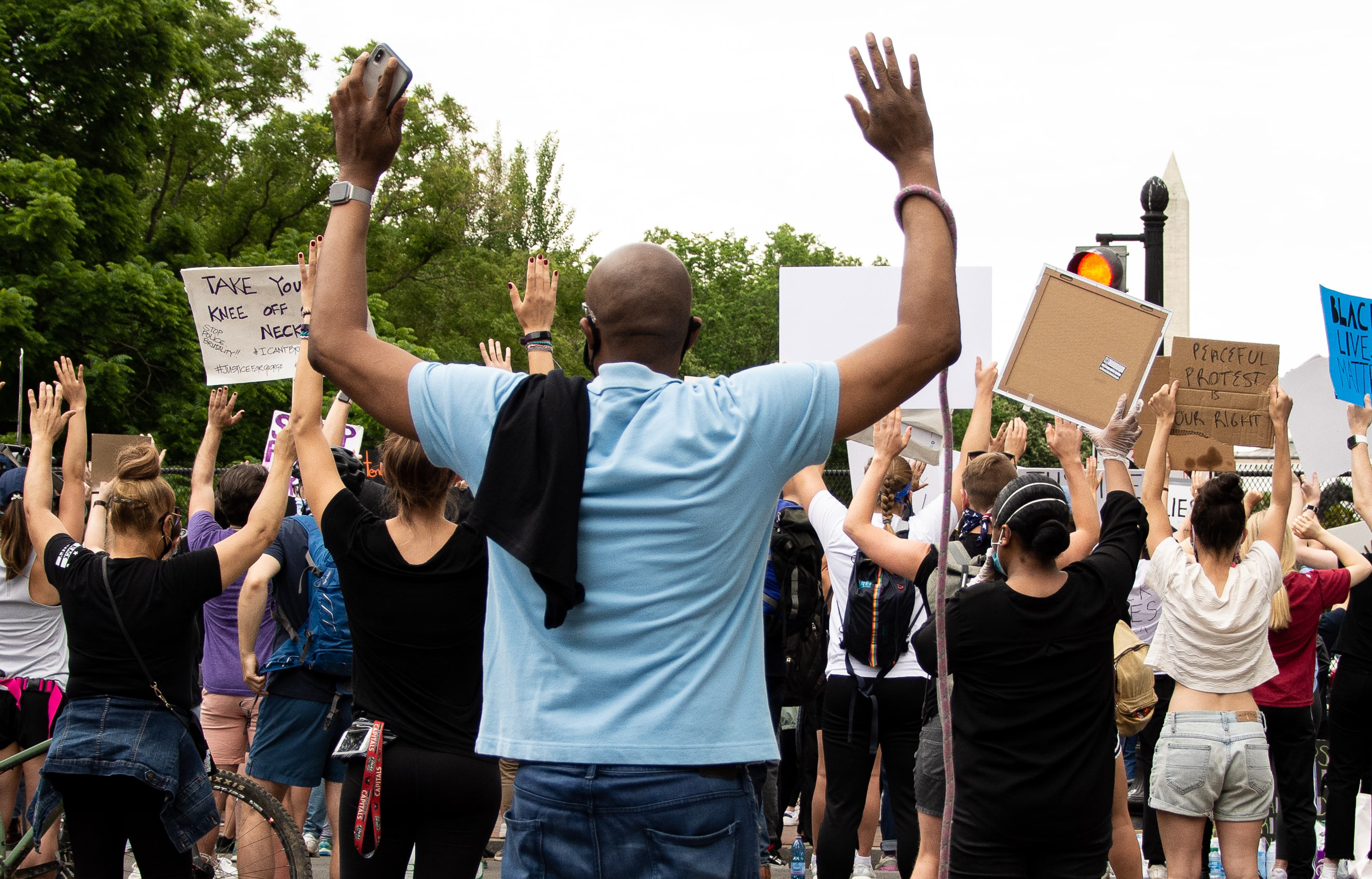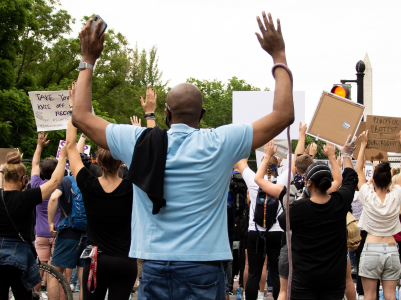By Ganoune Diop, Ph.D., General Secretary of the International Religious Liberty Association
– – –
This 20-minute video interview with Ganoune Diop provides an overview of the pandemic of racism, its root causes, religion’s role in racism (and healing from it), and the efforts of the G20 Interfaith Antiracism Initiative. The accompanying essay provides additional context, examples, and clarification.
The Landscape of Current Crises
The international community has faced serious potential threats to the survival of the human race. Nations are involved in multilateral consultations and agreements to thwart the all-too-real danger of nuclear threats. As it has been stated, “Our world increasingly depends on elaborate networks: electricity power grids, air traffic control, international finance, globally dispersed manufacturing, and so forth. Unless these networks are highly resilient, their benefits could be outweighed by catastrophic (albeit rare) breakdowns—real-world analogues of what happened in the 2008 global financial crisis.”[1]
Along with the threats to the survival of the human race, there are various current crises that are deeply and tragically affecting our world.
- Global health crisis: COVID-19, especially devastating among minorities.
- Public health crisis: Gun violence and mass shootings, suicides, homicides, and police killings, all rooted in the legitimization of violence.
- Economic crisis and hardship: The perennial problem of poverty, and disparity in access to essential goods, commodities and basic needs—a crisis rooted in the legitimatization and prevalence of greed, corruption and the valuing of profit over people.
- Financial crisis.
- Climate crisis.
- Migration crisis.
- Human trafficking and contemporary slavery crises.
- Human relations crisis: The perennial pandemic of racism, which has significantly exacerbated the challenges of all the above-mentioned crises. It also takes the forms of ethnocentrism, tribalism, casteism, and classism. It is based on human valuing, and the classification of human beings into “superiors” and “inferiors.”
It has become necessary and urgent to address this last crisis that intersects with all the other crises. Moreover, addressing this crisis is a condition sine qua non for the healing that is desperately needed at a global level. In many parts of the world, the resurgence of generational feuds is an all-too-frequent signal that deep healing is needed.
To overcome and abolish the crisis of racism, one has to go beyond symptoms to the root causes. Focusing on causation helps delineate the best diagnoses possible before suggesting solutions, prescriptions, and plans of action to implement and follow-up on in order to consolidate gains in humanizing our world.

Addressing, therefore, more specifically the crisis of racism, it is imperative to look at the root causes. More studies and intelligent conversations are needed, but for a general starting point of reflection, the following is in order:
Root Causes of the Pandemic of Racism
- Human valuing based on arbitrary scales of importance.
- The hierachicalization and stratification of humans into “superiors” and “inferiors” based on a faulty construct: the notion of race (see my article on racism).
- Even though a result of the ignorance of the oneness or unity of the human family and its intrinsic vocation to equality, “internalized dominance” in individuals’ psyches is part of the root causes of racism. It is a form of superiority complex or pride, based on the belief in one’s own superiority and on the assumption that indigenous peoples, Black people and people of color are inferior to the so-called Whites.
- Another root cause of racism is the urge to dominate fellow human beings. It is a sickness in the psyche of racist people. As such, it is a pathology. A benign form may be present in the sentiment that one is entitled to lead other human beings.
- The willful and strategic perpetuation over the past 500 years of the ascendance and dominance of people of European descent of a specific world order, which has created a matrix of domination. It structures societal institutions, reinforcing White privilege and disadvantaging and marginalizing indigenous people, Black people and people of color.
- One of the root causes of racism is also manifested through unjust systems of human discriminatory arrangements and practices (tribalism, clannism, ethnocentrism, casteism, and classism), which are all based on the premise of rejecting of the reality of one inherently equal humanity.

- A troubling root cause is a disregard for the value and sacredness of every human being’s life. Human beings, by virtue of the moral foundation of our being, are called to value life, to show solidarity with every other human being, based on the principle that all human beings are not only related but also sacred and therefore to be valued as much as—if not more than—temples, cathedrals and places of worship and shrines. This is because human beings are sacred. Protecting holy sites is certainly commendable. Protecting human beings deserves more resolved commitment. The sacredness of human conscience is the foundation of the sacredness of human beings, which is expressed as the sacredness of human life.
- One of the root causes of the perpetuation of personal, interpersonal, and corporate racism is the depth of denialism. One should not underestimate this problem. Racism is a contentious issue. A comfortable, silent complicity with the order of things would prefer to leave the issue buried in one’s subconscious. It is too threatening to the references we use to make sense of the meaning of life. The cruelty and inhumane record of racism contradicts and discredits the goodness of the human soul and experience. The brutality of racist ideologies and the violent practices justified by racism throughout history offend our very sense of humanity. Therefore, it is part of a coping mechanism to resort to denialism. It seems safer, though in reality it debilitates the one who harbors that denial. It is a deep lie ingrained in societal psyches. Denialism makes the world go on as if the chronic discrimination, dispossession, and disenfranchisement of indigenous people had not taken place, and as if there is nothing that can be done about it.
Clarifications on Antiracism
- One of the major mandates of the IF20 Antiracism Initiative is to actively participate in the healing of our human relations.
- This is a work of reconciliation which includes diagnosis, truth, forgiveness and restoration. It is an overarching effort to build a new human family based on respect, dignity, solidarity and possibly love. It requires changes in beliefs and practices; in other words, it is about how people view and relate to each other.
- This means that antiracism is a work of restoration purposed to re-humanize our world.
- Antiracism is to be translated into a lifestyle of standing in humility before the mystery of every human being.
- Once the above foundations are secured, the whole of reality can be reconfigured, and every sector of society grounded on better foundations of equality, equity and justice.
The Needed Contributions of Religions and Religious Organizations
Though they were historically part of the problem, religions can be part of the solution as they set their records straight in genuine repentance, repudiating past beliefs and practices. Religions have been instrumentalized for political gain. Religions have also participated in the theft of indigenous lands, the appropriation of biblical narratives to justify conquests and confiscations of indigenous people’s rights and possessions, and the promotion in writings and practice of the alleged “inferiority” of people of non-European descent.
In most countries, the religious structures of the past have lost their dominance over societies. However, religions used to claim divine endorsement, manifest destiny, election, and exceptionalism in being favored by a divine being. These claims have led to land annexations, land thefts, and the use of free labor. This meant depriving indigenous people of the right to life and Black people of the right to liberty.
A true healing of our world, if at all genuine, should include the regret and repudiation of past beliefs and practices. Humble recognition of injustices perpetrated in the past—whose consequences are still devastating for indigenous people, Black people and people of color—must be embraced. A true healing of human relations is predicated upon a deeply benevolent attitude toward and lifestyle around every person. It calls for unconditional adherence and commitment to the promotion of the freedom of others, even at one’s own expense, if that would be the cost.
The ultimate solution and antidote for racism is to accept and embrace the full humanity of every person: The sacredness of human conscience, the full dignity of being, and the full access to all human rights. These have to be legally protected and promoted to achieve a culture of respect for the mystery of every human being, and religions can help with that by fixing broken ideologies.
Major Thesis
The first human right is supposed to be the right to be human—the right to be related to and be treated like a human being, with dignity and respect just because of one’s humanity. This is the foundation of Justice. Freedom, self-determination, and non-instrumentalization by others have to be universally adopted and promoted as rights for all.
What is at stake is the challenge of our common humanity, and the meaning associated with it. Racism attacks the soul of our humanity as a deadly virus. Its ultimate antidote is the realization and embrace of the deep relatedness and solidarity that binds the whole human family (One Humanity). The ultimate solution has been expressed in many ways, such as the virtue of compassion (not condescension, but solidarity—or better yet, love of neighbor as oneself).
At the least, the so-called “golden rule” could place the human experience on a better platform: “Do to others what you want them to do to you.”
[1] Martin Rees. On the Future: Prospects for Humanity (Princeton & Oxford: Princeton University Press, 2018), 108-109.
– – –
Ganoune Diop, Ph.D., is General Secretary of the International Religious Liberty Association, Director of Public Affairs and Religious Liberty at the General Conference of Seventh-day Adventist World Headquarters, and Secretary at the Conference of Secretaries of Christian World Communions. He serves on the G20 Interfaith Forum Board of Directors, and formerly led the Anti-Racism Working Group.


